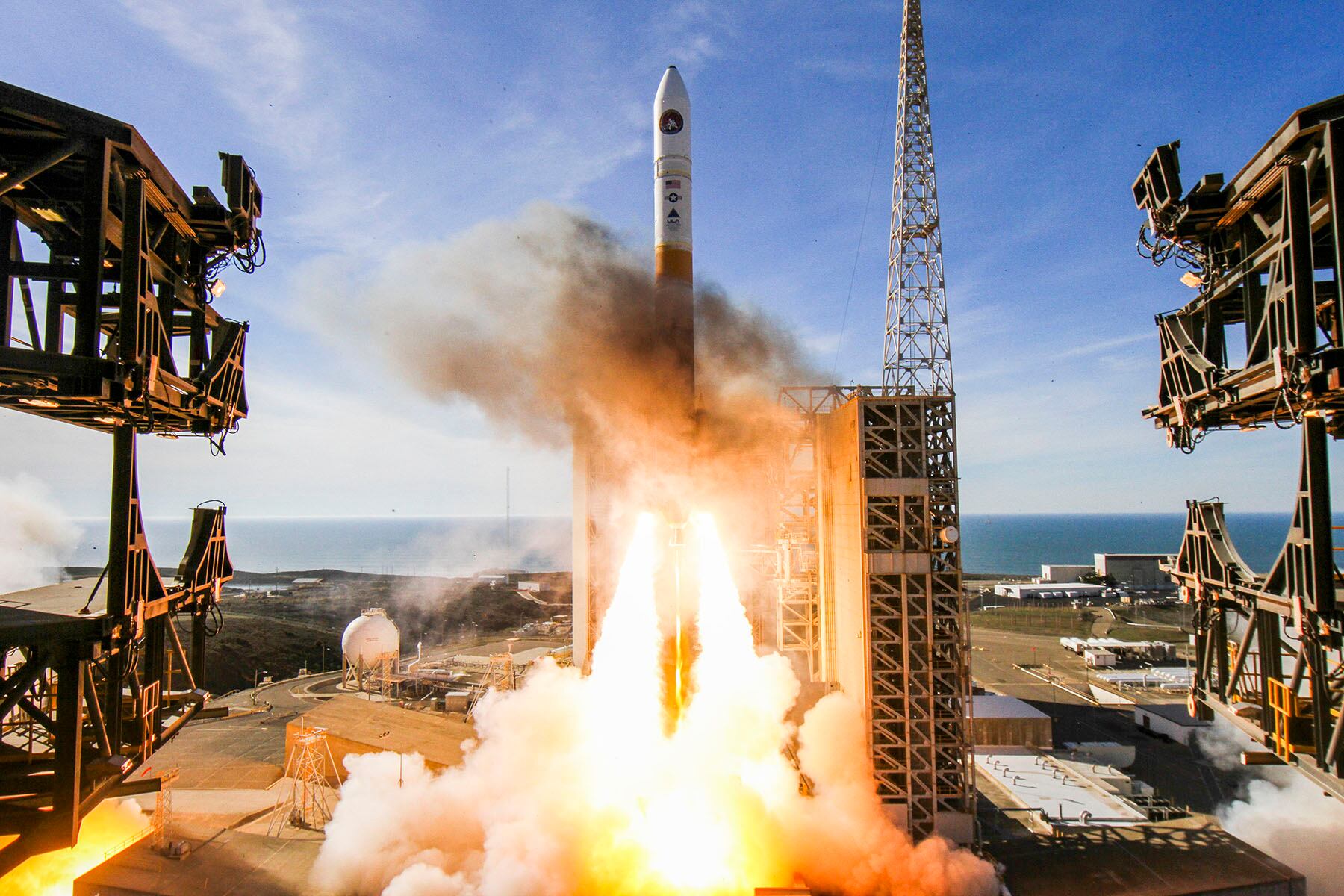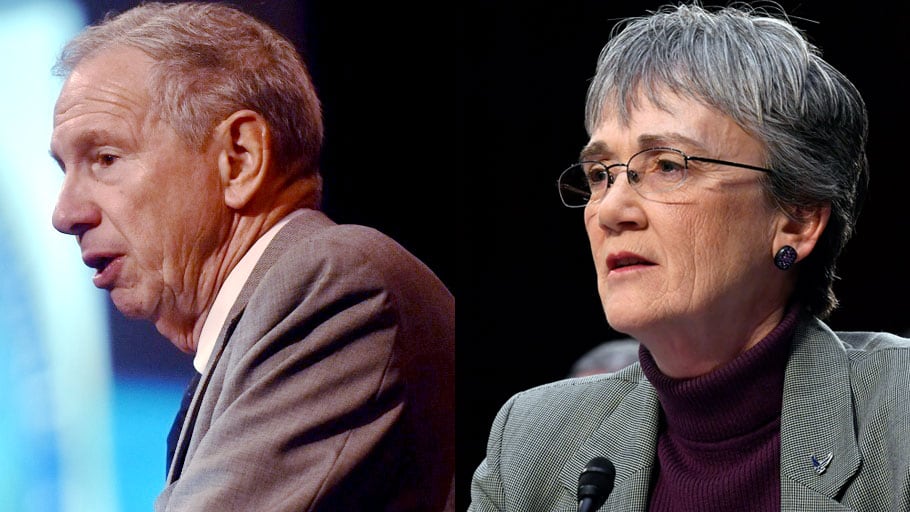WASHINGTON — A high-powered panel of Pentagon officials faced a group of skeptical senators Thursday during a key moment in the department’s push to create a new branch of the military focused on space.
Acting Defense Secretary Patrick Shanahan, Air Force Secretary Heather Wilson, Chairman of the Joint Chiefs of Staff Gen. Joe Dunford and U.S. Strategic Command chief Gen. John Hyten appeared together in front of the Senate Armed Services Committee to argue on behalf of the Space Force.
Committee Chairman Jim Inhofe, R-Okla., noted at the top of the hearing that the event was a rarity — in that senators seemed to genuinely come into it with an open mind, as opposed to looking to score political points. And that feeling did indeed play throughout the almost two hour and 50 minute hearing, with members attempting to dig for clarity about the potential new military branch.
RELATED

Going into the hearing, the Pentagon was well aware that this might be the best chance to sway skeptics. A read-ahead memo for Shanahan, drafted by Robert Hood, assistant secretary of defense for legislative affairs, called the hearing “the Department’s opportunity to sell SASC on Space Force.”
The document, which was obtained by Defense News and several other outlets, provided details on what each of the SASC members had said publicly — and, in some cases, privately in routine office calls — about the Space Force. It also offered guidance on the questions those lawmakers could ask.
“While Chairman Inhofe and Ranking Member [Jack] Reed have expressed skepticism, many members have yet to form an opinion or speak publicly on the proposal. Members have signaled support for both U.S. SPACECOM and SDA, but they have not yet been sold on the idea of a Space Force,” Hood wrote, using an acronym for the Space Development Agency.
“Most notably, while members seem to have an understanding of the space threat, the perception is that the Department has not been successful in explaining to them WHY the Space Force is necessary to address that threat.”
To be successful in selling the Space Force to Inhofe, Shanahan should be prepared to explain how Space Force could solve current space-related problems and why it would be worth the added cost, Hood wrote.
Reed, D-R.I., “fears Space Force ‘would just add bureaucracy without effect,’” Hood wrote. Meanwhile Sens. Kevin Cramer, R-N.D.; Marsha Blackburn, R-Tenn.; Joni Ernst, R-Iowa; and Rick Scott, R-Fla., had signaled they are willing to support the proposal.
Universally, members agreed that space is important, and not one expressed doubts about the importance of a U.S. Space Command, a combatant command that came about as the result of congressional orders. But the Space Force as a new branch was met with skepticism — early returns do not seem to have netted the results for which the Pentagon hoped.
Sen. Angus King, I-Maine, said he is “genuinely undecided, although as you can tell, I’m skeptical.” Presidential candidate Elizabeth Warren, D-Mass., expressly said she did not see the benefit of a new branch of the military. Sen. Joe Manchin, D-W.Va., told the panel that creating a new branch of the military “doesn’t make any sense to me. I’m sorry.”
RELATED

The skepticism was bipartisan, with Republican Sens. Mike Rounds of South Dakota and Tom Cotton of Arkansas indicating doubts about various parts of the proposal. Meanwhile, Sen. Dan Sullivan, R-Alaska, questioned whether the funding for a new service makes sense when readiness for existing military branches is dragging.
“Is it prudent to take on what would be a fairly disruptive element of a new aspect of the services in the United States military when the current five services, let’s face it, are not up to the readiness that they need to be?” Sullivan asked the panel.
Several senators asked about the uncertain role for the National Guard and Reserve components in a Space Force, something that the legislative proposal kicked down the road to fiscal 2021. In response, Dunford argued the department needs to start somewhere.
“There are a number of issues unresolved, and the real question in front of the committee is: Do we stand up that organization and get that four-star leader singularly focused on what the right organizational construct is, or do we wait for the perfect organizational construct to stand it up? What I felt was to move out and refine as we go, and the committee will have plenty of time to provide oversight,” Dunford said.
“So the initial, first step to take in this next fiscal year would be to stand up the organization, get the leadership in place and then begin to address these very important issues.”
That argument — that the Defense Department needs to get something up and running, and can work out the kinks as it goes — was one repeated multiple times throughout the event, by both Dunford and Shanahan. Whether the argument will fly with committee members is not yet clear.
RELATED

Pentagon watchers were closely tracking Shanahan and Wilson’s interactions, as the two have repeatedly clashed over the nature of the Space Force and its associated agencies — including on Tuesday when Wilson used remarks at Space Symposium to take repeated shots at the SDA.
Shanahan, sitting next to Wilson during the hearing, attempted to diffuse that situation early, using the third paragraph of his comments to praise the Air Force for its work in space.
“Let me open my comments on the Space Force by expressing my admiration for our U.S. Air Force. Because of our airmen, and Secretary Wilson’s leadership in particular, we are the best in space,” Shanahan said.
“This proposal is about maintaining the margin of dominance they have given us and accelerating the capabilities we need in this increasingly competitive domain. Establishing the Space Force within the Air Force lets us do just that,” he added.
When the subject of the SDA was broached midway through the hearing, Wilson reiterated her belief that the agency’s plan does not make sense.
Aaron Mehta was deputy editor and senior Pentagon correspondent for Defense News, covering policy, strategy and acquisition at the highest levels of the Defense Department and its international partners.
Valerie Insinna is Defense News' air warfare reporter. She previously worked the Navy/congressional beats for Defense Daily, which followed almost three years as a staff writer for National Defense Magazine. Prior to that, she worked as an editorial assistant for the Tokyo Shimbun’s Washington bureau.








